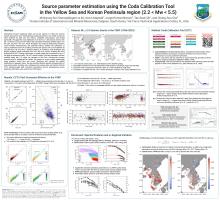Source parameter estimation using the Coda Calibration Tool in the Korean Peninsula and Yellow Sea region (2.2 < Mw < 5.5)
Minkyung Son, Kevin Mayeda, Jorge Roman-Nieves, Tae Seok Oh, & Chang Soo ChoPublished September 7, 2025, SCEC Contribution #14615, 2025 SCEC Annual Meeting Poster #027 (PDF)
Estimating moment magnitude (Mw) and source spectra is critical for seismic hazard assessment and understanding earthquake physics, but stable results are often hindered by path and site effects, simplified assumptions, and limited bandwidth. We apply the Coda Calibration Tool (CCT) to seismic events with ML ≥ 2.45 that occurred in the Yellow Sea and Korean Peninsula (YSKP) region over the past 30 years. The CCT, which leverages the empirical relationship between coda envelope characteristics and path/site effects, enables the estimation of source parameters from the resulting moment-rate spectra. We use broadband 20 sps data from 33 local and 5 regional stations to construct coda envelopes and employ apparent stress estimates from four Mw 4.9+ events, including the 2016 Gyeongju and 2017 Pohang mainshocks, to obtain stable site corrections in the 1-5 Hz range as reference events. The CCT results include ~1,000 Mw estimates, with the smallest being Mw 2.2, which we compare to Mw from time-domain moment inversion and to catalogued ML values. We present a source scaling relationship using apparent stress, Mw, and corner frequency, and examine the spatial distribution of apparent stress. We also describe distinct spectral characteristics of man-made events, including mine collapses and nuclear tests, and confirm that the CCT’s one-dimensional structure assumption and its energy-based source parameter estimation work well for the YSKP region.
Citation
Son, M., Mayeda, K., Roman-Nieves, J., Oh, T., & Cho, C. (2025, 09). Source parameter estimation using the Coda Calibration Tool in the Korean Peninsula and Yellow Sea region (2.2 < Mw < 5.5). Poster Presentation at 2025 SCEC Annual Meeting.
Related Projects & Working Groups
Seismology




